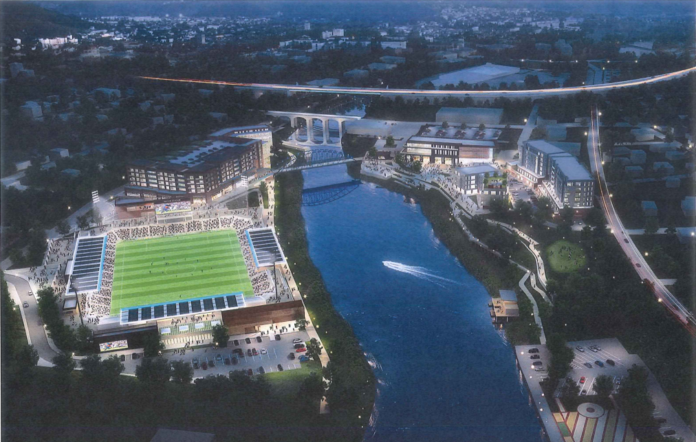
PAWTUCKET – If the state is going to pony up more public dollars to support the rising costs of the Pawtucket soccer stadium project, others are going to have to shell out more as well.
This was the sentiment expressed by multiple members of the R.I. Commerce Corp. board during a 3.5-hour meeting Monday, according to Alana O’Hare, a spokesman for Gov. Daniel J. McKee’s office.
“During the discussion, multiple Commerce Board members expressed that, if we are to proceed with the project, they are looking for non-state revenues to join in closing the $30 million financial gap,” O’Hare said in an emailed statement on Monday afternoon.
O’Hare did not say where McKee stands on the requested funding.
The discussion, which was held behind closed doors, comes on the heels of a request by the city of Pawtucket and developer Fortuitous Partners asking to borrow $30 million more than has already been approved for the Tidewater Landing project. R.I. Commerce previously authorized $36.2 million in tax-increment financing to help pay for public infrastructure included in the riverfront development, with the plan being that the revenue generated from the project will be used to pay back the bonds.
But inflation and supply chain problems have sent prices soaring, including for the Tidewater Landing project, which was originally pegged at $284 million but is now estimated to cost $344 million.
The extra $30 million in tax-increment financing is one of several funding pieces needed to complete the financial puzzle. The developer has also agreed to put in another $25 million in private equity and $31 million in private debt investment to cover the higher costs. Meanwhile, the city of Pawtucket will cover the cost for the pedestrian bridge connecting the two properties on either side of the Seekonk River, Pawtucket Mayor Donald Grebien said in a Zoom call with reporters on Monday. The city has applied for – but not received – federal funding to for that $5 million cost, Grebien said.
While R.I. Commerce has yet to decide – or even set a date for a vote – on the state public funding, proponents weren’t willing to contemplate a backup plan if the state economic arm denies or doesn’t fully fund their request.
“I am such an optimist I have not even begun to think about that,” said Brett Johnson, principal for Fortuitous. “It would be a disservice to start thinking about a plan B.”
Grebien also remained bullish about the project’s importance, touting the 435 residential units as well as jobs and economic development for a long-blighted area of city waterfront.
“I think we’ve convinced the board that this is more than just a stadium,” he said.
In addition to the flagship 10,000-seat United Soccer League stadium, the project also includes an outdoor event plaza and a riverwalk on the 17-acre Tidewater site west of the Seekonk River, along with 435 housing units, plus a parking garage and retail and commercial space, according to prior plan documents.
The project is expected to create more than 2,500 direct and indirect construction jobs and 1,200 permanent jobs, while adding $130 million annually to the state GDP, according to data shared by the city in 2019.
In a separate interview on Monday, Karl Wadensten, an R.I. Commerce board member and CEO and president of Richmond-based manufacturer VIBCO Inc., called the project a “great economic engine” for the state. While Wadensten declined to share his opinion on the additional public funding requested, he emphasized the project benefits not just to the city of Pawtucket but the entire state.
“To see something developed there, for anybody that drives by, is going to be a great economic engine, a visible economic engine,” Wadensten said.
R.I. Commerce Corp. has also previously approved $10 million in net state tax credits for the project.
Nancy Lavin is a PBN staff writer. You may reach her at Lavin@PBN.com.











